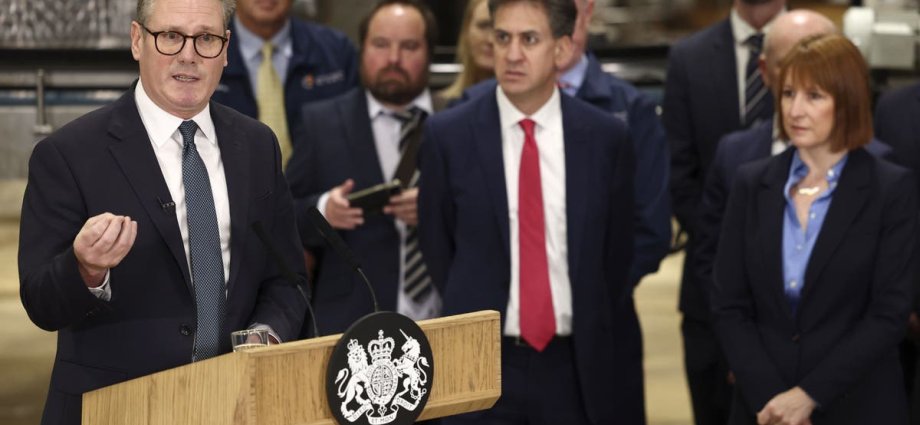Sir Keir Starmer said he wants to “relight the fires of renewal” in areas hit hard by deindustrialisation, as he pledged £22 billion for carbon capture and storage projects.
The Prime Minister added the Government’s focus on renewable energy is aimed at trying to keep bills “down for good” by improving the UK’s energy security.
His remarks came at a glassmaking factory in Cheshire as he announced plans to develop projects to capture and store carbon emissions from energy, industry and hydrogen production.
It is hoped the funding for two “carbon capture clusters” in Merseyside and Teesside, promised over the next 25 years, will create and support thousands of jobs, draw in private investment and help the UK meet climate goals.
Carbon capture, utilisation and storage (CCUS) is a technology which captures the emissions from burning fuels for energy or from industrial processes such as cement production, and uses or transports them for storage permanently underground – for example, in disused oil fields under the sea.
It is seen by the likes of the International Energy Agency (IEA) and the Climate Change Committee as a key element in meeting targets to cut the greenhouse gases driving climate change.
Sir Keir said carbon capture is a “race that we can win” thanks to the UK’s geology, heritage and experience in green finance.
The Prime Minister, who was joined on the visit by Chancellor Rachel Reeves and Energy Secretary Ed Miliband, said: “This is a technology that’s now arrived, that is ready with this investment to scale.
“But it is just the start. I’ve always believed that clean energy is a golden opportunity for our country, a chance to bring security and hope to working people, relight the fires of renewal in those areas that got hit so hard by deindustrialisation.”
Sir Keir said there is a “global race to get ahead”, adding: “I’m really pleased that we’re putting ourselves in a position not just to be in that global race, but to win that global race and that’ll be measured in thousands of jobs for literally decades to come.”
Sir Keir later said renewable energy offers “lower energy bills for good” and is cheaper than fossil fuels and prevents reliance on the international market.
He said: “There is always the challenge of the short-term versus the long-term, but if you never do the long-term decisions you will always have the short-term problems, and that’s where we’ve been stuck for 14 years.
“This is about making sure we’re taking the long-term decisions to keep those energy bills down for good for millions of people across the country.”
Funding of up to £21.7 billion over 25 years focuses on subsidies to three projects in Teesside and Merseyside, once they start capturing carbon from hydrogen, gas power, and energy from waste, to support the development of the clusters, including the infrastructure to transport and store carbon.
The funding will also support the two transport and storage networks which will carry the carbon captured to deep geological storage in Liverpool Bay and the North Sea.
Speaking on Friday, Mr Miliband paid tribute to the end of coal-fired energy production in the UK.
He said: “If Monday was the end of an era, today with this Government’s decisions a new era begins.
“Carbon capture and storage, a new industry, a new generation of good jobs in our industrial heartlands.”
Emma Pinchbeck, chief executive of Energy UK, described CCUS as a “tool in our armoury of technologies which we need to decarbonise parts of energy that we currently can’t do with clean electricity, such as major industrial processes”.
James Richardson, acting chief executive of the Climate Change Committee, said: “It’s fantastic to see funding coming through for these big projects.
“We can’t hit the country’s targets without CCUS so this commitment to it is very reassuring.”
But Greenpeace UK’s policy director, Doug Parr, said £22 billion “is a lot of money to spend on something that is going to extend the life of planet-heating oil and gas production”.
While he acknowledged it was vital the Government committed to industrial investment and job creation while tackling the climate crisis, “it needs to be the right sort of industries”.
Shadow energy secretary Claire Coutinho said: “Exceptional local leaders like Ben Houchen have worked on this for years and it’s thanks to the Conservatives that funding was already announced for these projects in the spring of 2023.
“But whilst this is undoubtedly good news for carbon capture jobs, this will not make up for the mass deindustrialisation pathway that Ed Miliband’s costly net-zero and energy policies are leading us to, with the devastating impact of his zealotry on jobs already seen in steelmaking, refineries and in the North Sea.”











